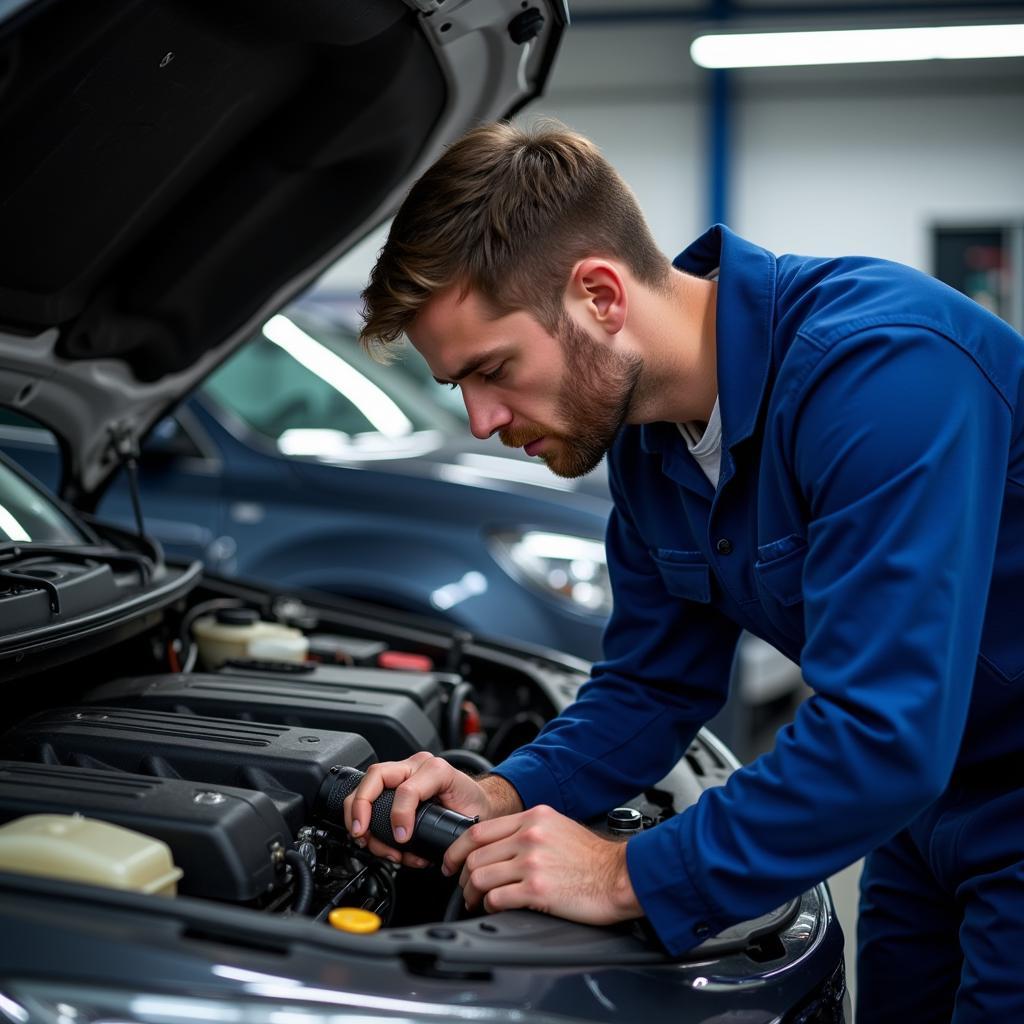Understanding your car’s health doesn’t require a mechanic’s degree. With a simple Car Diagnostic Checklist, you can become your own car doctor and catch potential issues before they turn into expensive headaches. Whether you’re buying a used car, experiencing strange noises, or simply staying ahead of maintenance, this checklist is your key to a healthier, happier driving experience.
What is a Car Diagnostic Checklist and Why Do You Need It?
Imagine this: you’re cruising down the highway, windows down, music playing, and suddenly, your engine sputters. Panic sets in. A car diagnostic checklist is your shield against these unexpected breakdowns. It’s a comprehensive guide to help you identify potential problems with your vehicle by focusing on key areas like:
- Engine Performance: Is your check engine light on? Are you experiencing poor fuel economy?
- Transmission: Do you feel slipping or jerking when changing gears?
- Brakes: Are you hearing any squealing or grinding noises? Do your brakes feel spongy?
- Electrical System: Are your headlights dimming? Are your battery terminals corroded?
- Exhaust System: Do you notice excessive smoke or unusual smells?
Essential Car Diagnostic Checklist Items
This checklist covers the basics for everyday car owners. For a more in-depth analysis, consider visiting a professional mechanic or using a dedicated car diagnostic tool.
1. Visual Inspection:
- Fluids: Check engine oil, coolant, brake fluid, power steering fluid, and windshield washer fluid levels. Look for any discoloration or unusual consistency.
- Belts and Hoses: Inspect for cracks, fraying, or looseness.
- Tires: Examine tire pressure, tread depth, and overall condition.
- Lights: Test headlights (high and low beams), taillights, brake lights, turn signals, and hazard lights.
- Wipers: Ensure wiper blades are in good condition and make proper contact with the windshield.
2. Under the Hood:
- Battery: Check for corrosion on terminals and ensure connections are tight.
- Air Filter: Inspect for dirt and debris. Replace if necessary.
- Coolant Hoses: Squeeze gently to check for cracks or leaks.
- Drive Belts: Listen for any squealing noises when starting the engine.
 Mechanic Inspecting Car Engine
Mechanic Inspecting Car Engine
3. Inside the Car:
- Dashboard Warning Lights: Pay attention to any illuminated warning lights, especially the check engine light.
- Gauges: Monitor engine temperature, fuel level, speedometer, and tachometer for any unusual readings.
- Steering Wheel: Check for any looseness or play.
- Brakes: Test brake pedal firmness and listen for any unusual noises.
4. On the Road:
- Engine Performance: Listen for any strange noises, vibrations, or hesitation during acceleration.
- Transmission: Observe for any slipping, jerking, or rough shifting.
- Steering: Ensure the car tracks straight and responds smoothly to steering inputs.
- Braking: Test brake responsiveness and any pulling to one side.
 Car on Road Diagnostic
Car on Road Diagnostic
Decoding Common Car Problems
Understanding some basic car terminology can make all the difference when troubleshooting issues:
- Check Engine Light: This light can indicate a range of problems, from a loose gas cap to a serious engine malfunction. Use an OBD-II scanner to retrieve specific error codes.
- Misfire: This occurs when fuel in the engine cylinders doesn’t ignite properly. Symptoms include rough idling, poor acceleration, and decreased fuel economy.
- Knocking Sound: A knocking or pinging noise from the engine could signal a problem with the ignition timing, fuel quality, or engine bearings.
- Brake Squealing: A high-pitched squealing noise when applying the brakes usually indicates worn brake pads.
When to Seek Professional Help
While this car diagnostic checklist can help you identify potential problems, it’s crucial to remember that it’s not a substitute for professional diagnosis and repair. If you’re unsure about anything, or if your car is experiencing persistent issues, schedule an appointment with a qualified mechanic immediately. Remember, early detection is key to preventing costly repairs and ensuring your safety on the road.
FAQs
1. How often should I perform a car diagnostic checklist?
It’s recommended to perform a basic visual inspection of your car at least once a month and a more thorough checklist every three months or before long trips.
2. Can I use a car diagnostic checklist to fix problems myself?
While the checklist can help you identify potential issues, it’s not a DIY repair guide. It’s best to consult a qualified mechanic for any repairs.
3. What should I do if my check engine light is flashing?
A flashing check engine light indicates a serious problem that needs immediate attention. Stop driving as soon as possible and contact a mechanic.
4. How do I know if my car needs a tune-up?
Signs your car may need a tune-up include rough idling, decreased fuel economy, engine stalling, and difficulty starting.
5. Is it necessary to check my tire pressure regularly?
Yes, maintaining proper tire pressure is crucial for safety, fuel efficiency, and tire longevity. Check your tire pressure at least once a month and before long trips.
6. What is an OBD-II scanner and do I need one?
An OBD-II scanner is a device that connects to your car’s computer system to retrieve diagnostic trouble codes (DTCs). While not essential for everyone, owning one can be helpful for identifying check engine light issues.
7. Can weather conditions affect my car’s performance?
Yes, extreme temperatures, humidity, and salt can impact your car’s battery, fluids, and other components. Be sure to adjust your car maintenance routine accordingly.
Need Help with Your Car Diagnostics?
Don’t wait for a breakdown to happen. Our team of expert car diagnostic technicians is here to help you keep your car running smoothly. Contact us today for professional car diagnostics services in:
- Car engine diagnostics San Antonio
- Halfords car diagnostic code’s
- Car diagnostics Caroline Springs
- Car diagnostic Bolton
- Car diagnostic mechanic near me
We offer comprehensive diagnostic services, including:
- Engine diagnostics
- Transmission diagnostics
- Brake diagnostics
- Electrical system diagnostics
- And much more!
We use the latest diagnostic equipment and technology to accurately identify and diagnose any problems with your vehicle. We also offer competitive pricing and convenient scheduling.
Don’t let car troubles slow you down. Contact us today!
WhatsApp: +1(641)206-8880
Email: [email protected]
Our customer support team is available 24/7 to answer your questions and schedule an appointment.

Leave a Reply